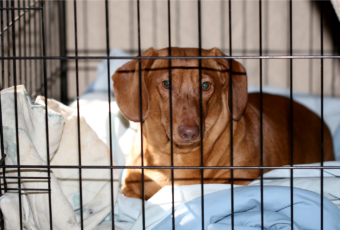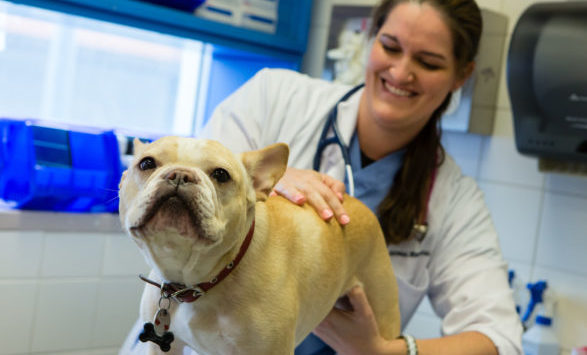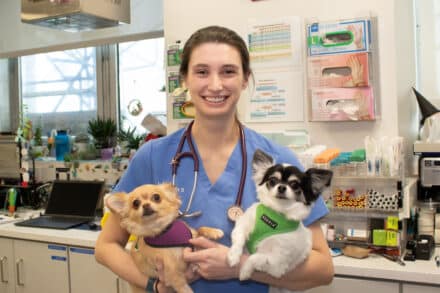Coccidia

Background
Coccidia are singled-celled organisms (protozoa) that can infect animals, leading to diarrhea and occasionally blood in the stool. Infection is common in both dogs and cats but typically does not cause illness. As a matter of fact, almost all cats will be infected with coccidia at least once in their life. While it is uncommon for signs of illness to occur, puppies, kittens, and immunocompromised pets are most at risk for coccidiosis, the disease caused by coccidia that can make the animal very sick.
Infection occurs when an animal accidentally ingests coccidia shed through the feces of an infected animal. Oftentimes, coccidia is transmitted through contact with a contaminated object or environment, such as water or soil that have been tainted with feces. Different species of coccidia infect different animals. From what we know, species that infect dogs do not infect cats and vice versa. One particular coccidia species that is common in cats, Toxoplasma gondii, is dangerous for humans, particularly pregnant individuals, as it can cause Toxoplasmosis.
Risk Factors
All pets are at risk for contracting coccidia if they are exposed to a contaminated environment, particularly those living in a shelter or kennel. The infective eggs of coccidia (called oocysts) can survive for up to a year after being shed through feces, particularly in moist environments.
Puppies, kittens, and immunocompromised pets are at risk for more severe cases of infection.
Signs
Common signs of coccidiosis include:
- Diarrhea (sometimes bloody)
- Weight loss
- Dehydration
While the above signs are indicators of coccidiosis, most dogs and cats infected with coccidia show no clinical signs of infection whatsoever.
Diagnosis
A coccidia infection is diagnosed through a fecal test. The stool sample can be refrigerated overnight in a sealed container until you are able to give it to your veterinarian, who will have the feces specially processed so the coccidia can be seen under the microscope. Not all pets with coccidia in the feces need treatment. Your veterinarian will determine the necessity of treatment with medications to kill the coccidia and also determine if your pet is dehydrated and needs fluids.
Treatment
Pets diagnosed with coccidiosis typically require no treatment for the infection. Cats in particular tend to eliminate the infection spontaneously on their own. However, your veterinarian may prescribe medication to help your pet deal with the gastrointestinal discomfort an infection can bring. For severe illness causing dehydration, your veterinarian may need to administer subcutaneous or intravenous fluids.
Prevention
There are many steps pet owners can take to prevent the spread and contraction of coccidia in themselves and their pets.
Environmental Safety
Always make sure your pet has access to safe and clean drinking water. If you have a dog, use a portable water bowl while taking them on a walk and make sure they do not drink water from potentially contaminated sources where animals may have left feces. This is also helpful in preventing Leptospirosis where animals may have left feces. If you have a cat, keep them indoors to prevent them from getting infected with coccidia or other zoonotic diseases.
If Your Pet Has Coccidiosis
Keep your pet isolated from any other animals in the house if they are infected with coccidia. Pick up any feces immediately after your pet has defecated and dispose of it in the trash. Make sure your hands are covered with a glove and/or bag, or that you are using a scooping device (such as with a litterbox).
Thoroughly wash your hands, clothes, and any objects and surfaces that your sick pet has been in contact with to avoid spreading the parasite to other pets.
Reinfection by self-grooming may also occur if any oocysts are present on your pet’s fur. Follow your veterinarian’s directions for bathing and E-collar use to minimize the chances of reinfection.
Further Information
For more information on protecting yourself and your pet from zoonotic diseases, check out our articles on Zoonotic Diseases and Parasite Protection for Dogs.
Make an Appointment





























